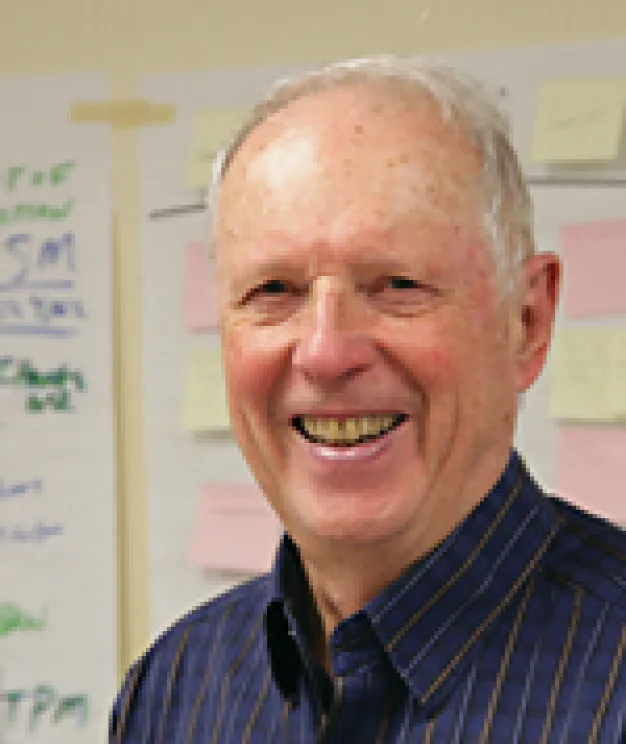Dr. R. Eugene Goodson is a Tauber Insititute Executive in Residence Emeritus. A pioneer of plant assessment and lean manufacturing tools, the University of Michigan is proud to have him currently serving as Adjunct Professor at the Ross School of Business.
Throughout his 50 year career, Dr. Goodson has held leadership positions at the university level, in government, and industry. He holds degrees from Duke University and M.S. and Ph. D. degrees in Mechanical Engineering from Purdue University. As a Purdue Professor from 1963 to1981, he published over 30 referred journal papers and consulted in the aerospace, process, and transportation industries. He was U.S. DOT Chief Scientist from 1973 through 1975 and led Purdue’s interdisciplinary institute to national prominence. From 1977 through 1980, he led the Opportunity Risk Assessment for Electric and Hybrid Vehicles for the Department of Energy and the Electric Power Research Institute.
Moving to industry in 1981, Dr. Goodson led Johnson Control’s automotive seating business from a $150 million supplier to a $1.3 billion tier one systems supplier. He headed up Oshkosh Truck Corporation from 1990-1997, when his team took Oshkosh from a defense contractor to market dominance through internal growth and acquisitions.
Dr. Goodson returned to a university environment in 1998 as Adjunct Professor at the University of Michigan Business School teaching operations management. His Rapid Plant Assessment (RPA) lean tool, described in the paper “Read a Plant; Fast”, published in the Harvard Business Review, is used by many companies in their lean transformation journey. He continues an active consulting practice on lean transformation and business development.
In 1998, he was retained by American Industrial Partners and became Chairman, CEO, & President of Williams Controls and continued as Chairman until 2012. He was also Executive Chairman of CIS Corporation, a computer components supplier, from 1999 through 2005.
In 2006, Dr. Goodson accepted the position of CEO, President, and Board Chairman of Southwall Technologies Corporation in Palo Alto, CA. Southwall made sputtered film that controls energy and light transmission. He remained a board member and consultant until the company’s sale to Solutia in 2011. He also is on the boards of Defiance Metal Products, Allied Specialty Vehicles (ASV), and Bergstrom, Inc., Manac, and Powis.
Q: How did being Executive in Residence become a stop on your career path?
A: Other universities expressed an interest to Professor Roman Kapuscinski about teaching RPA and taking it over. I believe this sparked the Tauber co-directors -- as it was developed and taught here at Michigan -- that they ought to take this over. It was a mutual agreement. I am at the age where I would like to see somebody take this over, but it is a legacy that I certainly am capable of helping to carry forward right now.
Q: What kinds of changes have you seen over the years, in terms of students and their interests or what drives them?
A: Students are hungry for real stuff. So touring plants and assessing them is something they really embrace. It is real, not theory. Having an experience where they can go out into the industrial world and be capable of assessing it is something they value. I hear from students who took the RPA course at Michigan saying they use it all the time. I have been around long enough that I have seen the pendulum go back and forth. The educational process tends to go naturally to theory but students move to “how does this really work?”
Q: How is Tauber striving to provide the best education for their engineering and business students?
A: They understand that the tension between theory and how things really work is ongoing. My main purpose is to see that the RPA process is one of the tools used to train future leaders. I’m back to help that process of transferring the tool to the Tauber students.
Q: Do you hear from former students?
A: I do hear from a small percentage. Many of them are leaders in their organizations and they say, “Thank you for this tool. It has really helped me in my career.”
Q: What surprises you about business today?
A: RPA is determining the state of lean of an operation. Whether it be a fast food store or microbrewery or a Ford factory. It is a tool used to assess the state of lean. It continually astounds me why this simple straightforward idea of lean – and this is simple stuff – is something that many companies still haven’t done. To me this is most astounding. But it remains a cultural thing. It is hard for some to change.
View more Tauber IAB profiles >

